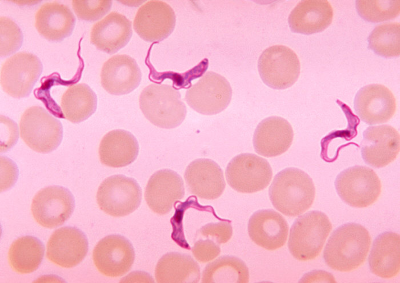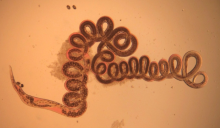Parasitology
 African trypanosomiasis is a vector-borne parasitic disease of medical and veterinary importance. The causative agents of this disease are various species of genus of Trypanosoma, which are extracellular protozoan parasites equipped with a flagellum that emerges from the flagellar pocket and provides the parasite with its motility. Upon the bite of the mammalian host by a trypanosome-infected tsetse fly, the parasites enter the blood circulation via lymph vessels. The parasites can multiply in the bloodstream and interstitial fluids of the host, causing a chronic infection associated with a persistent inflammatory response. Inflammatory responses are required to control the infection; however, excessive immune responses will lead to tissue destruction. Dr. Shi’s lab is studying how the balance between protective immune responses and immunopathology is regulated during the parasite infection. His lab is interested in the role of cytokines in regulating immune balance and preventing immunopathogenesis during trypanosome infection. In addition, his lab is characterizing the molecular mechanisms underlying intravascular clearance of the parasites using in vivo imaging.
African trypanosomiasis is a vector-borne parasitic disease of medical and veterinary importance. The causative agents of this disease are various species of genus of Trypanosoma, which are extracellular protozoan parasites equipped with a flagellum that emerges from the flagellar pocket and provides the parasite with its motility. Upon the bite of the mammalian host by a trypanosome-infected tsetse fly, the parasites enter the blood circulation via lymph vessels. The parasites can multiply in the bloodstream and interstitial fluids of the host, causing a chronic infection associated with a persistent inflammatory response. Inflammatory responses are required to control the infection; however, excessive immune responses will lead to tissue destruction. Dr. Shi’s lab is studying how the balance between protective immune responses and immunopathology is regulated during the parasite infection. His lab is interested in the role of cytokines in regulating immune balance and preventing immunopathogenesis during trypanosome infection. In addition, his lab is characterizing the molecular mechanisms underlying intravascular clearance of the parasites using in vivo imaging.
 Infections with gastrointestinal nematode parasites are an important cause of economic loss on farms worldwide. Livestock infected with these nematode parasites show a variety of clinical signs, including scouring, anaemia, loss of body weight and in severe cases death. The nematode parasites develop sophisticated mechanisms to escape host immune responses, especially mucosal immune responses against the parasites. Dr. Zhu’s lab is collaborating with Dr. Wenbin Tuo to identify the proteins secreted by the parasites that interfere with host mucosal immune responses. Dr. Tuo is a senior research scientist at Animal Parasitic Diseases Laboratory, USDA ARS, Beltsville, MD.
Infections with gastrointestinal nematode parasites are an important cause of economic loss on farms worldwide. Livestock infected with these nematode parasites show a variety of clinical signs, including scouring, anaemia, loss of body weight and in severe cases death. The nematode parasites develop sophisticated mechanisms to escape host immune responses, especially mucosal immune responses against the parasites. Dr. Zhu’s lab is collaborating with Dr. Wenbin Tuo to identify the proteins secreted by the parasites that interfere with host mucosal immune responses. Dr. Tuo is a senior research scientist at Animal Parasitic Diseases Laboratory, USDA ARS, Beltsville, MD.